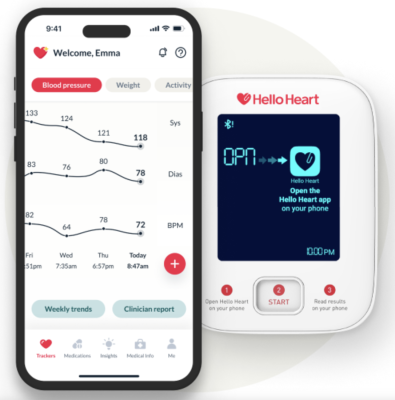
April 24, 2024 —Hello Heart, a digital leader in preventive heart health, today announced results from its latest study observing the benefits of scalable, accessible digital health tools for a growing senior population. Presented at the American College of Cardiology 2024 Conference, study results showed an overwhelming majority of seniors aged 65 and over reduced their blood pressure (BP), cholesterol, and weight over a six month period while managing it with a mobile app, highlighting the potential of mobile technology in the prevention and control of cardiovascular disease (CVD) for the aging population.
Cardiovascular disease the leading cause of death in the US
Eighty percent of heart attacks and strokes are preventable. Yet, CVD remains the leading cause of death in the U.S., partially because its key risk factor, high blood pressure, is a ‘silent killer,’ and most patients have no symptoms before their first heart attack or stroke. CVD is especially prevalent in the Medicare-aged population, affecting more than 75 percent of those aged 60-79 and more than 90 percent of those aged 80 and over.
Mobile app records heart health risk factors
The study observed 8,148 Hello Heart users aged 65 and over who were equipped with the Hello Heart connected monitor and mobile app. The monitor and app recorded blood pressure, heart rate, and the appearance of irregular heartbeat. The app also recorded other significant heart health risk factors, such as cholesterol, weight, and physical activity via integration with external sources including electronic medical records and fitness trackers. Based on these data points, the app used artificial intelligence (AI) and behavior science to provide personalized and actionable heart health insights to patients and their physicians. Results from the study showed:
- Among participants with baseline systolic blood pressure (SBP) above 140 mm Hg, 84% lowered their SBP by an average of 18 points within 26 weeks of monitoring.
- Among participants with baseline LDL cholesterol (LDL-C) above 160 mg/dL, 80% reduced their LDL-C within four months, with a mean reduction of 76.6 mg/dL.
- Among participants with baseline body mass index (BMI) above 30 kg/m2, 70.4% reduced their weight within 3 months with a mean reduction of 8.8 lbs.
- Study participants showed a 45% higher engagement rate compared to Hello Heart users younger than 65.
“Results from this study challenge the assumption that our aging population struggles to use smartphones or are resistant to using technology to manage their health,” said Edo Paz, MD, SVP, Medical Affairs, Hello Heart. “There’s a significant untapped opportunity to engage this age group with scalable mobile technology to help them better understand their CVD risk and take steps to improve their heart health.”
Research shows that a 10 point reduction in systolic blood pressure helps lower the risk of coronary heart disease (17%), stroke (27%), heart failure (28%), and all-cause mortality (13%).
About the heart app study
The study evaluated engagement and clinical outcomes among age 65+ participants of an mHealth app-based CV risk self-management program. Participants aged 65+ who enrolled in the Hello Heart app from January through October 2023 were studied retrospectively. Change in blood pressure (BP), LDL cholesterol, and weight were evaluated from baseline to follow up. Engagement was evaluated as the cumulative number of BP values measured in the app. Outcomes were compared for participants aged 65+ vs. <65.
For more information: www.helloheart.com
Find more ACC24 conference coverage here
Related Senior Health Content:
New Advance Against a Form of Heart Failure Prevalent in Men
DECIDE-Salt Study Finds Salt Substitutes Help to Maintain Healthy Blood Pressure in Older Adults


 July 31, 2024
July 31, 2024 









